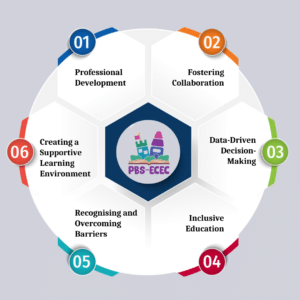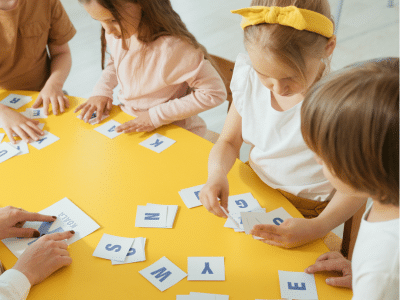By Andri Agathokleous
Socio-emotional learning and wellbeing in early childhood education are attracting growing attention, as researchers continuously emphasise their drastic benefits for children at the start of, and across, their educational journey. Indeed, recent studies have shown that supporting children’s socio-emotional learning also predetermines more long-term factors of their personal growth, equipping them with the ability to self-regulate emotions and behaviours, establish meaningful relationships, as well as set limits and manage expectations later in life.
But as we uncover the apparent benefits, the obvious question remains: how can we leverage socio-emotional learning in educational settings? Most importantly, what should we be doing as parents, care-givers, teachers, researchers and support staff to not only better equip the next generation with essential skills, but also reduce the odds of mental and social irregularities in the future?
The lessons we draw from PBS-ECEC
These and more questions are addressed in the recent report released by the PBS-ECEC initiative, led by CARDET and IoD in Cyprus, that focuses on harnessing the potential of Positive Behavioural Support (PBS) in early childhood education. The report delves on the findings and conclusions drawn through the introduction of PBS-fueled tools and the first round of pilot trainings and implementations and puts forward structured practice recommendations.
In particular, the report proposes a systematic approach, in six actionable steps, to reap the full benefits of addressing children’s and educators’ wellbeing.
1. Professional Development: Empowering Educators
It is essential that professionals working in early childhood education and care (ECEC) such as teachers, assistants and head-teachers are offered comprehensive and ongoing training programmes in the field. Only through continuous professional development we can address the gaps among early childhood educators and make any strategy viable. It’s not just about imparting knowledge; it’s about empowering them to create an inclusive and positive environment for children’s growth.
2. Fostering Collaboration: A Unified & Inclusive Approach
The socio-emotional learning of children isn’t, and shouldn’t be, solely the responsibility of educators. Nor can they succeed on their own. It is of utmost importance that all stakeholders, including teachers, special educators, parents, and therapists collaborate to foster a consistent approach in all environments. This will ensure that support is offered and progress is encouraged in all settings and not lost based on the context that children find themselves in. Thus, it is critical that open communication, resource sharing, and unified problem-solving are adopted for a more cohesive and effective implementation.
3. Data-Driven Decision-Making: Monitoring and Improving
Continuous assessment and evaluation, through data collection and monitoring are key, especially when it comes down to measuring the effectiveness of the approaches used, as well as the need for their finer attunement to the specific classroom. Through a consistent self-assessment using evaluation tools and baselines, teachers can make informed decisions and tailor their interventions for the best results.
4. Inclusive Education: A Multi-Tiered Approach
A multi-tiered approach that entails universal support actions, catered-specific assistance and additional support is essential to ensure that every child’s needs are met. This process involves introducing and popularising assessment instruments to identify children who require extra support to help teachers engage and include families and specialists in the intervention process.
5. Recognising and Overcoming Barriers
Implementing PBS in ECEC obviously does not come without its challenges. Smaller preschool settings, limited staff resources, and constraints on time are just a few of the barriers that educators face. The key though, is to acknowledge these obstacles in order to proactively address them. By designating responsible educators for PBS oversight, involving families, and providing training and mentorship programmes, these barriers can be mitigated. In this way, preschool settings can foster an inclusive and supportive environment for children’s socio-emotional development.
6. Creating a Supportive Learning Environment
Ultimately, the success of PBS in ECEC hinges on creating a supportive learning environment. This involves observing, reflecting, and adapting pedagogical practices to meet the unique needs of young learners. Quality interactions with children, respect for their emotional needs, and clear, consistent rules should all be a part of the equation.
Conclusion: A Path Forward
When we consider the PBS model not in isolation, but in conjunction with the existing educational practices, it is without a doubt a powerful tool to empower young children and teachers to emphasise a positive and supportive school environment from all angles. However, it is clear that to achieve long term and impactful results, all parties involved in a child’s life and education need to act as a team and follow a consistent and targeted approach to initiate socio-emotional change.
To help you through this process, and in hopes of bringing this design from theory to practice, PBS-ECEC has published numerous training and educational materials that can help in the subtle implementation of the model in any classroom. These materials have been thoroughly tested in school systems across Europe and are ready for your review alongside a full report on the findings here.
Andri Agathokleous is a psychologist currently involved as a researcher at the Institute of Development in various projects focusing on promoting teachers’ and students’ wellbeing. Her involvement in PBS-ECEC projects mainly focused on supporting ECEC teachers to develop competencies to manage challenging behaviour by promoting children socio-emotional learning.







Click here to change your cookie preferences